Basic Earth Skills
Earth Skills Are Easy! Rewild Portland offers a series of one day workshops on earth skills also referred to as “primitive skills”, “ancestral skills”, “survival skills”, or “bushcraft”. These skills are often perceived as something only a hard-core wilderness survival skills expert can produce. Each class goes through many of the basic crafts of earth skills and focuses on showing just how easy these skills actually are. We focus on one craft per workshop. Participants take home their finished product after just one day of crafting. It takes much more time to complete earth skills from scratch, and it is a more difficult process. These classes are designed to be a quick, easy, and painless introduction to earth skills. If, on the off chance, you do not complete your project, you may still take it with you and bring it to any of our Monthly Free Skills Series where you can receive further instruction at no additional cost!
Preregistration closes the day before the class unless the class is full. We cap the classes at 10 students unless another instructor is available and then we open it up to 20. We prefer a 1:10 radio of teachers to students. We use the many natural areas around Portland as our classroom. If the weather is bad, such as in the winter time, class is held indoors or under a roof with a campfire. All classes are held in central locations in the Portland area, driveable, bikeable and near a bus line. We provide all the materials you will need. The location and other class details will be e-mailed to you upon completing your registration. Refunds are given up to one week before the date of the class. To see what we are currently offering check out our Adult Programs Page.
This is a list of some of our offerings.
FRICTION FIRE KIT
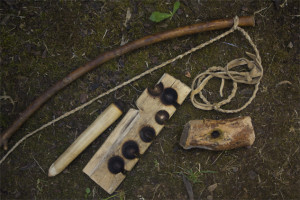
Fire is one of the ultimate technologies that separates humans from other animals. Over hundreds of thousands of years humans have learned to master the arts of fire. In our class we will make a bow-drill set, one of the most classic methods for making a fire by “rubbing two sticks together”. Participants will each make a set to take home with them at the end of class. We will also go over the proper form for drilling and perhaps get a fire or two before the day is over!
BONE TOOLS
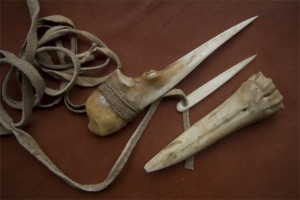
Once upon a time in history, the bone awl was one of the most important multi-purpose tools that people would carry with them wherever they went. Bone is one of the hardest natural materials. It breaks down over time and is eaten by animals. For this reason, stone receives more credit as a household tool of our “Stone Age” ancestors. Like most natural materials, bone is shaped through abrasion: scoring, scraping, snapping, splitting and sanding. In this class we will make a bone awl and a bone needle out of deer bones.
GOURDS
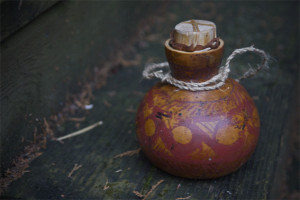
One of the first plants to be domestication, gourds have been used by humans for thousands of years as water vessels, bowls, instruments and more. At our class we will turn newly dried gourds into canteens, plates, and bowls. Once finished we will decorate our gourds with paint.
WET-FELTING
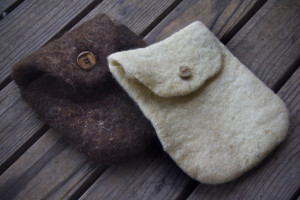
Wet-felting is the process of creating felt using water and friction. In our class we will make felted bags or a hat and go through all of the basics of felting.
LEATHER BAG, RAWHIDE POUCH
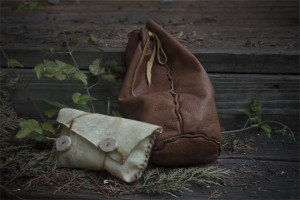
Rawhide and Buckskin (or tanned leather) are two completely different kinds of materials but both can be worked in similar ways. We will cover how to stitch both kinds of leather using just an awl. In the class each student will make one leather bag and one rawhide pouch.
COILING BASKETRY
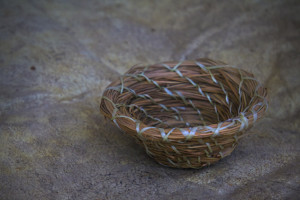
Coiling is a kind of basket making that is more like sewing than it is like weaving. By coiling pieces together in a round shape and stitching them up as you go, you create a beautiful and elegant basket.
BARK CONTAINERS
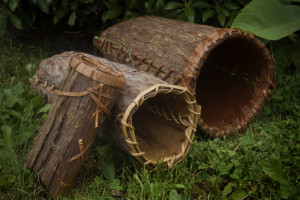
Before buckets people had to use the materials available to them to create larger light weight containers for transporting things like food, tools and other resources. The bark container or bark “bucket” is a simple, straightforward method for creating a container that is durable and long lasting. There is no weaving required.
PLAITED BASKETRY
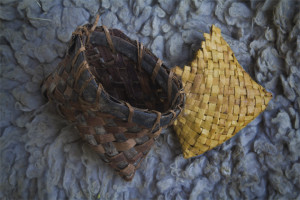
Plaiting is when you weave together long flat strips of materials through layering them rather than twisting or twining then around one another. It makes a very sturdy and aesthetically pleasing basket for all kinds of uses.
BASIC STONE TOOLS
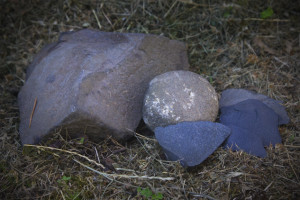
While arrowheads are the pretty stone tools that dazzle the eyes, there are more practical stone tools that take priority over the eye-catching ones. The “Oldowan Industry” was the first stone tool technological innovation by human hands. These tools, while crude, are still practical today for anyone interested in human history and evolution, or those who want to learn to make survival knives from stone. These tools are very basic, but do take some time and practice to be able to produce at will. In our class, students will walk away not with just a few new tools, but with an understanding of how to reproduce the tools on their own.
GLASS ARROWHEADS
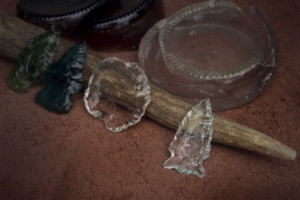
Arrowheads are the most attractive stone tool. These days, flint-knapped arrowheads are more practical as earrings than they are for hunters who have access to steel. Still, there is something to be said about making the tools yourself. At our class we will learn to knapp or “pressure flake” arrowheads out of salvaged pieces of glass. Obsidian is a volcanic glass that people have taken much of from the wild in order to learn flint-knapping. A more sustainable alternative is glass, which breaks in the exact same way as obsidian stone. We are helping to preserve the wild and using this recyclable material to teach an ancient skill.
If you would like to request us to come teach any of our Earth Skills Are Easy classes at your school or with your club, send us a message:
Basic Earth Skills
Earth Skills Are Easy! Rewild Portland offers a series of one day workshops on earth skills also referred to as “primitive skills”, “ancestral skills”, “survival skills”, or “bushcraft”. These skills are often perceived as something only a hard-core wilderness survival skills expert can produce. Each class goes through many of the basic crafts of earth skills and focuses on showing just how easy these skills actually are. We focus on one craft per workshop. Participants take home their finished product after just one day of crafting. It takes much more time to complete earth skills from scratch, and it is a more difficult process. These classes are designed to be a quick, easy, and painless introduction to earth skills. If, on the off chance, you do not complete your project, you may still take it with you and bring it to any of our Monthly Free Skills Series where you can receive further instruction at no additional cost!
Preregistration closes the day before the class unless the class is full. We cap the classes at 10 students unless another instructor is available and then we open it up to 20. We prefer a 1:10 radio of teachers to students. We use the many natural areas around Portland as our classroom. If the weather is bad, such as in the winter time, class is held indoors or under a roof with a campfire. All classes are held in central locations in the Portland area, driveable, bikeable and near a bus line. We provide all the materials you will need. The location and other class details will be e-mailed to you upon completing your registration. Refunds are given up to one week before the date of the class. To see what we are currently offering check out our Adult Programs Page.
This is a list of some of our offerings.
FRICTION FIRE KIT
Fire is one of the ultimate technologies that separates humans from other animals. Over hundreds of thousands of years humans have learned to master the arts of fire. In our class we will make a bow-drill set, one of the most classic methods for making a fire by “rubbing two sticks together”. Participants will each make a set to take home with them at the end of class. We will also go over the proper form for drilling and perhaps get a fire or two before the day is over!
BONE TOOLS
Once upon a time in history, the bone awl was one of the most important multi-purpose tools that people would carry with them wherever they went. Bone is one of the hardest natural materials. It breaks down over time and is eaten by animals. For this reason, stone receives more credit as a household tool of our “Stone Age” ancestors. Like most natural materials, bone is shaped through abrasion: scoring, scraping, snapping, splitting and sanding. In this class we will make a bone awl and a bone needle out of deer bones.
GOURDS
One of the first plants to be domestication, gourds have been used by humans for thousands of years as water vessels, bowls, instruments and more. At our class we will turn newly dried gourds into canteens, plates, and bowls. Once finished we will decorate our gourds with paint.
WET-FELTING
Wet-felting is the process of creating felt using water and friction. In our class we will make felted bags or a hat and go through all of the basics of felting.
LEATHER BAG, RAWHIDE POUCH
Rawhide and Buckskin (or tanned leather) are two completely different kinds of materials but both can be worked in similar ways. We will cover how to stitch both kinds of leather using just an awl. In the class each student will make one leather bag and one rawhide pouch.
COILING BASKETRY
Coiling is a kind of basket making that is more like sewing than it is like weaving. By coiling pieces together in a round shape and stitching them up as you go, you create a beautiful and elegant basket.
BARK CONTAINERS
Before buckets people had to use the materials available to them to create larger light weight containers for transporting things like food, tools and other resources. The bark container or bark “bucket” is a simple, straightforward method for creating a container that is durable and long lasting. There is no weaving required.
PLAITED BASKETRY
Plaiting is when you weave together long flat strips of materials through layering them rather than twisting or twining then around one another. It makes a very sturdy and aesthetically pleasing basket for all kinds of uses.
BASIC STONE TOOLS
While arrowheads are the pretty stone tools that dazzle the eyes, there are more practical stone tools that take priority over the eye-catching ones. The “Oldowan Industry” was the first stone tool technological innovation by human hands. These tools, while crude, are still practical today for anyone interested in human history and evolution, or those who want to learn to make survival knives from stone. These tools are very basic, but do take some time and practice to be able to produce at will. In our class, students will walk away not with just a few new tools, but with an understanding of how to reproduce the tools on their own.
GLASS ARROWHEADS
Arrowheads are the most attractive stone tool. These days, flint-knapped arrowheads are more practical as earrings than they are for hunters who have access to steel. Still, there is something to be said about making the tools yourself. At our class we will learn to knapp or “pressure flake” arrowheads out of salvaged pieces of glass. Obsidian is a volcanic glass that people have taken much of from the wild in order to learn flint-knapping. A more sustainable alternative is glass, which breaks in the exact same way as obsidian stone. We are helping to preserve the wild and using this recyclable material to teach an ancient skill.
If you would like to request us to come teach any of our Earth Skills Are Easy classes at your school or with your club, send us a message:
Send us a message:
We would love to hear from you! Please fill out this form and we will get in touch with you shortly.